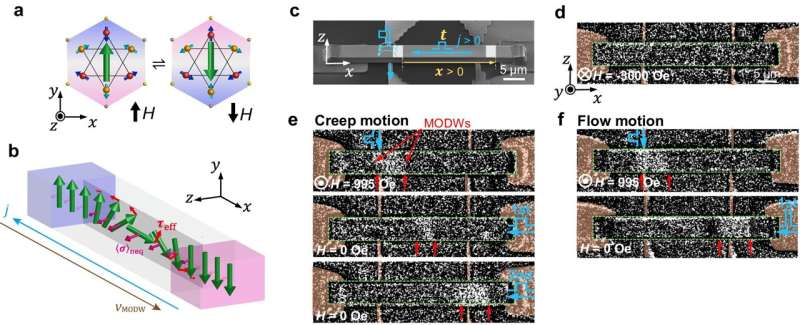Physicists at RIKEN have demonstrated how ultrafast, low-power-consumption memory devices could be realized by replacing conventional magnetic materials with novel ones.
In conventional hard disk drives, the magnetic disk has to be physically moved to read to and write from the disk. This has the disadvantages of being slow and susceptible to mechanical problems.
A better approach would be to use electrical currents to move the walls between magnetic domains—microscopic regions in a magnetic material in which the magnetic moments align in consistent fashion. So-called domain-wall devices are promising for realizing rapid, low-power memory devices.
“In the case of a hard disk drive, you have a small coil which has to be physically moved around,” explains Yoshichika Otani of the RIKEN Center for Emergent Matter Science. “But for devices based on domain walls, you don’t need any mechanical movement. Rather, the domain wall moves, and you can read and write information electrically without any mechanical motion.”
Domain-wall devices have been investigated using ferromagnetic domains in which all the spins in a domain are parallel with each other. But these require high current densities to push the domain walls around, which results in high power consumptions. The domains also generate stray magnetic fields, which makes it challenging to cram a lot of them into a small space, making miniaturization difficult.

Antiferromagnetic domains in which the spins are arranged in alternating directions could overcome both these problems. But their low net magnetic fields are a double-edged sword—they are beneficial for miniaturization, but they make it difficult to manipulate and detect the domains.
Now, Otani and his co-workers have demonstrated a new approach for realizing domain-wall devices based on antiferromagnetic materials that overcomes this difficulty. The work is published in the journal Nature Communications.
The secret to their approach was to use noncollinear antiferromagnets in which sublattice moments form cluster magnetic octupoles. This contrasts with the much more commonly used magnetic dipoles, which have two poles and resemble tiny bar magnets.
Using this structure, the team was able to accelerate domain walls to speeds of 750 meters per second using about a hundredth of the current density needed to move ferromagnet domain walls.
The findings came as a nice surprise to the team. “We weren’t confident that it would work with octupoles,” says Otani. “But it actually worked when we tried it, and so we were pleasantly surprised.”
More information:
Mingxing Wu et al, Current-driven fast magnetic octupole domain-wall motion in noncollinear antiferromagnets, Nature Communications (2024). DOI: 10.1038/s41467-024-48440-9
Citation:
Magnetic octupoles help overcome problems with antiferromagnets (2024, October 17)
retrieved 18 October 2024
from https://phys.org/news/2024-10-magnetic-octupoles-problems-antiferromagnets.html
This document is subject to copyright. Apart from any fair dealing for the purpose of private study or research, no
part may be reproduced without the written permission. The content is provided for information purposes only.

